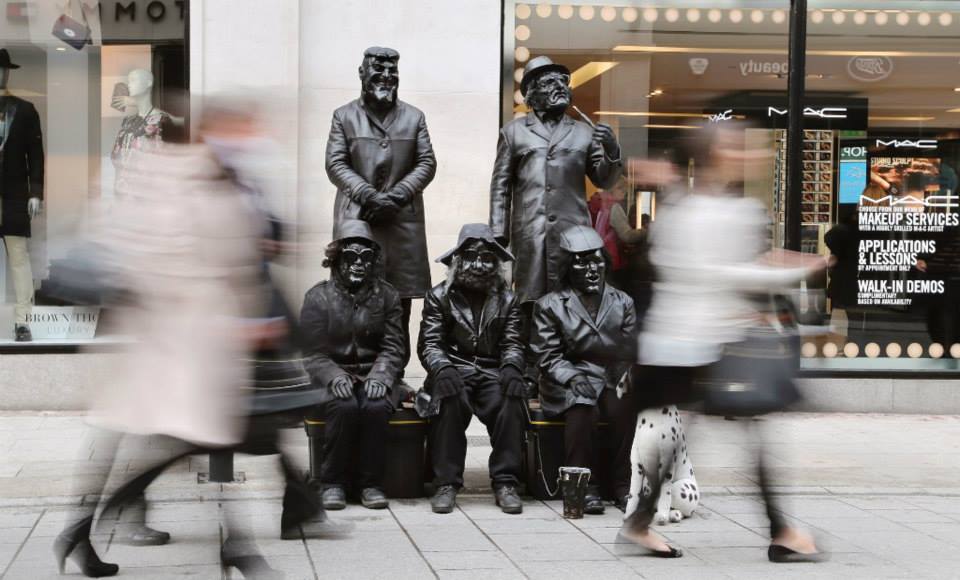Daniel O’Brien | Opinions Editor
If it’s not raining too hard, and there aren’t too many tourists, and you’re not in too much of a hurry (an admittedly unlikely convergence of circumstances), Grafton Street is among the most romantic spots in Dublin. A number of factors make it so: the feeling of relentless energy and excitement combines with visually stunning architecture to create a unique blend of cultural heritage and thriving modernity. On a December evening, with the Christmas lights lit, it can even top the quays for places you’d go out of your way to see.
There’s also a less obvious factor at play, one that is subtle, but inextricably linked to the idea of Grafton Street. It’s the music, coming always from somewhere but seemingly from nowhere, providing a real life soundtrack to the day’s adventures. We have buskers to thank for this.
Even if we assume that talented buskers make more money than less talented ones, it seems inevitable that their compensation will fail to match the benefits they provide.
I use the term busker here to refer primarily to musicians, although it more accurately reflects an entire array of street performers. This will be useful for two reasons: first, because I personally derive the most enjoyment from musicians, which is a key point of this article, and second, because their music is more or less directly experienced by everyone within earshot. Participation is of the opt-out rather than the opt-in variety.
Whereas some of the more esoteric performers can be annoying or even terrifying (I’m thinking of the statue-men in the first instance, and the chanting shaman person in the second), street musicians are almost unequivocally ‘good’. I mean that not in terms of talent, but rather that I have rarely (or more likely never) encountered a situation where I would be happier if a musician stopped playing or singing. A possible exception is when tourists form an unnecessarily large circle of viewership and block all available walking space, though that is hardly the performer’s fault.
But the fact that everyone can, or indeed must, experience the music without paying for it raises the question of how the work of the busker can be sustainable. Even if we assume that talented buskers make more money than less talented ones, it seems inevitable that their compensation will fail to match the benefits they provide.
The mystique of busking comes from its proudly independent nature, the romanticised struggle to find success against the odds in a vastly competitive world.
Those benefits come at a personal level, from the unquantifiable improvement to your day that comes from experiencing something moving, inspirational, or simply incredible. They also come at a societal level, from the aforementioned charm that accumulates around places like Grafton Street, attracting spending to local businesses and building an international reputation for both city and country.
One solution would be for the government to pay buskers with public funds, in the same way it provides parks or policing services. Schedules could be regulated along with wages, ensuring that performers are properly distributed both in terms of talent and location. This solution holds a certain theoretical appeal: skilled buskers could make a full-time living of it, society would have an optimal supply of public music, and never again would one enterprising lad with a guitar struggle to be heard over another who just so happened to bring an amp with him.
But while all of that may be ‘ideal’ in a sterile, economic sense, it rightly comes off sounding a bit overly contrived, and maybe even counterproductive. The inherent mystique of busking comes from its proudly independent nature, the romanticised struggle to find success against the odds in a vastly competitive world. Turning an expression of anti-authoritarianism into another tool of the state risks draining any unique value derived from the activity. At that point we might as well just have PA systems playing pleasant background music on every corner.
Try to keep in mind the exact benefit that you derive from any specific performer, and consider what exactly you are doing to perpetuate that benefit.
The struggle, then, is how to more closely reconcile the busker’s compensation with the value he or she provides, without undermining the source of that value by doing so. The solution is fairly simple on paper, but far more difficult to implement in practice. Try to keep in mind the exact benefit that you derive from any specific performer, and consider what exactly you are doing to perpetuate that benefit. Pay more attention to, and wherever possible actually pay, the buskers from whom you gain particular enjoyment. Yes, even if that means the statue-men, robot dancers, and sand sculptors.
Photo by Tomasz Szykulski for The University Times







